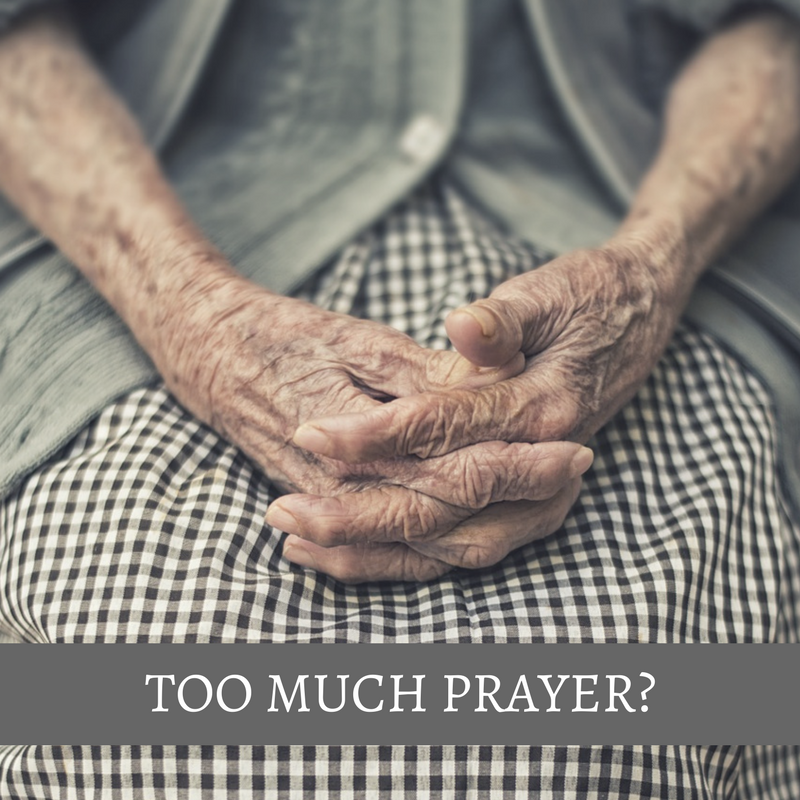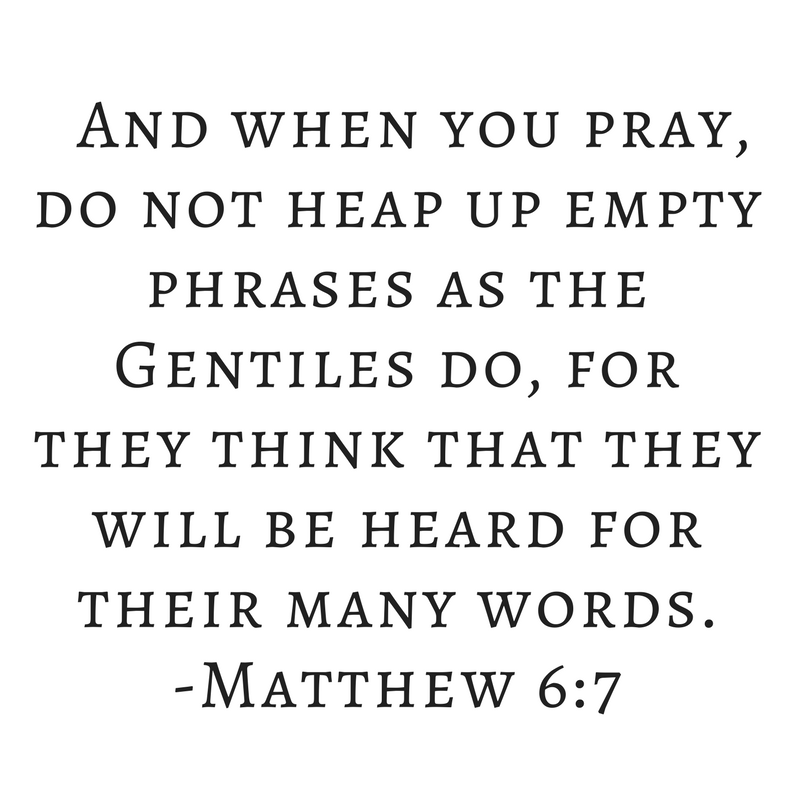
Is it ever possible to pray too much? This question is both easy and hard to answer. The short answer is “No, you cannot pray too much.”
However, when we start talking about praying for specific people, places, and things over defined periods of time, we will need to apply wisdom and walk with the Spirit to answer this question in each personal situation people will encounter.
In other words, while you cannot pray too much, I believe it is possible to pray too much about certain things or certain desires, especially when the Holy Spirit is trying to move you forward but for some reason you won’t let a certain prayer request go.
So what does the Bible say about praying too much?
The Bible Says You Cannot Pray Too Much
We can answer the question, “Can you pray too much?” with confidence because the Bible instructs us on multiple occasions to pray continually and to pray about everything:
Rejoice in hope, be patient in tribulation, be constant in prayer.” (Romans 12:12)
“Rejoice always, pray without ceasing, give thanks in all circumstances; for this is the will of God in Christ Jesus for you. Do not quench the Spirit.”(1 Thessalonians 5:16-19)
“Do not be anxious about anything, but in everything by prayer and supplication with thanksgiving let your requests be made known to God.”(Philippians 4:6)
“Praying at all times in the Spirit, with all prayer and supplication. To that end keep alert with all perseverance, making supplication for all the saints…” (Ephesians 6:18)
These Bible verses are clear. You cannot pray too much since we are commanded to pray all the time. Certainly this does not mean we must lock ourselves in the closet all day.
“Kneeling prayer” or “closet prayer” certainly should be a huge part of our devotional life. Having a defined time where you do nothing but focus on God in prayer; listening, praising, confessing, thanking, and making request of him is core to the health of Christian.
But to be “constant in prayer” has more to do with being a spirit of prayer and being sensitive to the Spirit’s always present leading and guidance. In summary, the Bible says we can never be too prayerful or too connected to God in active conversation and listening.
You Cannot Pray Too Much, But You Can Pray With the Wrong Motives
While prayer is usually an expression of faith, I believe there is a type of panicked prayer that is rooted in a lack of faith. We can often pray more in certain seasons about specific requests not because we trust God so much, but because we are lacking trust in him.
 Again, it’s never wrong too pray. Anxiety should lead us to pray. But in maturity, we must also recognize there are times our consistent prayers are more like whiny children concerned their way is not going to happen. James 4:3 (NIV) captures the heart of what I’m trying to say, “When you ask, you do not receive, because you ask with wrong motives, that you may spend what you get on your pleasures.”
Again, it’s never wrong too pray. Anxiety should lead us to pray. But in maturity, we must also recognize there are times our consistent prayers are more like whiny children concerned their way is not going to happen. James 4:3 (NIV) captures the heart of what I’m trying to say, “When you ask, you do not receive, because you ask with wrong motives, that you may spend what you get on your pleasures.”
To barrage God with demanding requests, thinking the regularity of your prayers will be the key to receiving your request is unbiblical. So if you are only praying because you think God is not listening very well or because you think each prayer is scoring you a point in heaven that will eventually equal enough golden stars on your star chart, then this type of “constant prayer” is wrong.
I’m not going to say someone in this scenario is “praying too much.” But I do think it is possible to be praying more than usual because of impure motives. The problem here is not with the amount of prayers but with the motive fueling this onslaught of prayers.
You Can’t Pray Too Much, But You Can Pray About Certain Things Too Much
Often times the idols of our hearts are exposed in the consistent content of our prayers. God’s words would certainly be more gracious and effective than mine in the following examples, but perhaps for some of us God is saying something like this:
- “Really? Are we talking about her again? I already told you it’s not going to happen. You are idolizing this girl. Stop asking me to allow you to date her?”
- “Look, I know you want a bigger church, but I keep telling you I want you to shepherd the 150 sheep you have right now. Stop idolizing mega churches. I’ve not called you to that in your life. Your requests for a bigger church are saying to me that you are discontent in our relationship and that you find your identity in the size of your congregation rather than in your crucified and risen Savior.”
- “I know that person really wronged you, and I know you usually feel better after you pray about this. But you have forgiven this person over 1000 times now. You’ve had counseling. You’ve forgiven him. It’s time to stop praying about this all the time. You’re healed. You’ve done all you can in that situation. Next time it comes to mind, you don’t need to pray about it. The first 1000 times were very helpful. Now your prayers about this are keeping you stuck rather than moving your forward. Let’s move on together, shall we?”
Barnabas Piper, son of John Piper, recently talked about this topic in reference to the recent divorce he went through. He stated:
If you’re invested in a marriage those feelings don’t just turn off. The only way to turn off those feelings is to start hating—which isn’t good. I had to make the decision to stop praying for my ex once we were divorced. This is one of those things that’s going to make people scrunch up their eyebrows, but I believe the best thing to do once someone has divorced you is when they come to mind surrender them to God. It’s the prayer of Jesus in the garden ‘not my will, but yours be done.’ You may be letting go of them to experience God’s judgment for their actions or to experience a change of heart. But that’s not up to you anymore. You’re moving on. . . . I think about David and Bathsheba. When their child is dying David prays and begs and mourns for the child’s life. But once the child has died David gets up, gives it to God, and moves on with life.”
Certainly what Barnabas Piper said here should not be taken as the rule. It should not be over applied. We’re not talking about the biblical principles of divorce right now. I don’t believe everyone who is divorced, for example, should no longer prayer for their ex. Each person will need to walk with God through the specifics of each situation. But this is a good example of how not praying about something can sometimes be helpful in the process of moving on.
While the Bible Does Not Say You Can Pray Too Much, It Does Say You Can Be Too Inactive
I’ve heard it said, “You can be too spiritually minded to be any earthly good.” I get what people are trying to say here, but the statement is false.
What I would say is that if your spiritual activity is not resulting in some physical action steps eventually, you are doing something wrong. To say you can be “too spiritually minded” seems like the problem is based in our attention to God. But you can never be too spiritually minded if you are basing your mind’s activity on Scriptural truth.
The Bible does say, however, that you can be too inactive in life (Philippians 2:12-13, 2 Peter 1:5, 2 Thessalonians 3:10-13). The problem therefore, is not with how spiritually minded you are but with how limited your actions are. You can’t pray too much, but you can be too practically inactive in life.
You Can Pray Too Many Mindless Prayers About the Same Thing Over and Over Again
While you can never pray too much, we can turn prayer into a religious act when we say platitudes rather than actually commune with God. In Matthew 6:7-9 Jesus explains:
And when you pray, do not heap up empty phrases as the Gentiles do, for they think that they will be heard for their many words. 8 Do not be like them, for your Father knows what you need before you ask him. 9 Pray then like this….”
Jesus’ warning to not heap up empty phrases is not a warning against praying too much. Rather, Jesus is saying that the volume of your words has nothing to do with the effectiveness and quality of your prayers. Jesus did not stop with a warning against wordy prayers. He then continued with instruction on how to pray properly.
If God knows what we need before we even ask him as Matthew 6:8 says, why does he require us to pray at all? God could give us what we need and want without our prayers, but since God wants us to pray as much as possible, he often waits to bless us with needs and wants until we ask him.
In summary, you cannot pray too much; but you can pray with wrong motives, about the wrong things, with inactivity after you pray, and with too many words that don’t actually mean anything. Praying is never the problem. How and why we pray, however, are areas we should pay close attention to in our personal prayer lives.
Wow,such a powerful article.God bless you abundantly for sharing.Learnt so much
So glad it was helpful! God bless,
-Mark